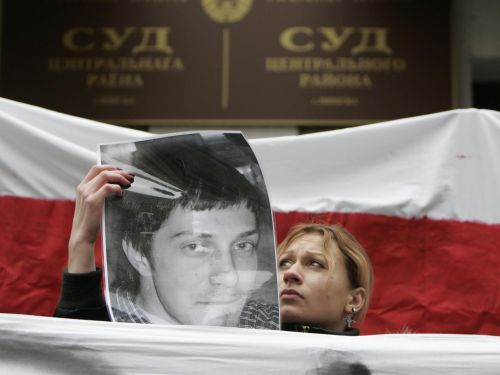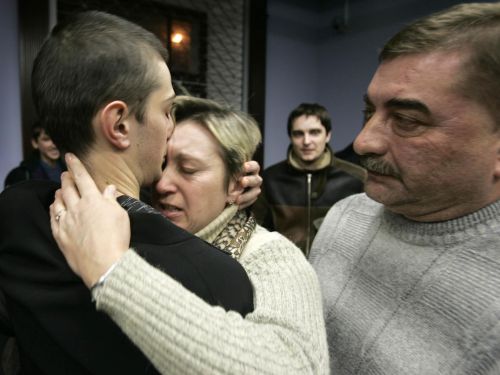 The trial went in a tense atmosphere. At the very beginning, the majority of human rights activists, politicians, and supporters of Barazenka were banned from the courtroom; all photo reporters were also forced to leave the room. The building was surrounded by special military squads, dozens of law-enforcement officers were on each floor. There were scuffles between the police and participants of the Barazenka support action held outside the court building. Andrei Kim, a former political prisoner and another participant of the Process of Fourteen, was severely beaten. The defendant’s mother, Alena Barazenka, was pushed and insulted by Uladzimir Tsiukhai, one of the leaders of the pro-governmental Belarusian Republican Youth Union. During the trial, Barazenka was held in a cage as a dangerous criminal
The trial went in a tense atmosphere. At the very beginning, the majority of human rights activists, politicians, and supporters of Barazenka were banned from the courtroom; all photo reporters were also forced to leave the room. The building was surrounded by special military squads, dozens of law-enforcement officers were on each floor. There were scuffles between the police and participants of the Barazenka support action held outside the court building. Andrei Kim, a former political prisoner and another participant of the Process of Fourteen, was severely beaten. The defendant’s mother, Alena Barazenka, was pushed and insulted by Uladzimir Tsiukhai, one of the leaders of the pro-governmental Belarusian Republican Youth Union. During the trial, Barazenka was held in a cage as a dangerous criminal
According to the Human Rights Center “Viasna”, no witnesses were able to identify Barazenka as a participant in the entrepreneurs’ protest actions, of which Barazenka was actually accused. Even the police footage of protest actions failed to confirm Barazenka’s participation in them. However, despite the lack of proofs, Judge Natallia Vaitsiakhovich sentenced Barazenka to one year of restricted freedom. The political prisoner was set free right in the courtroom.
Assessing the results of the Process of Fourteen, human rights defender Valiantsin Stefanovich notes, "The European Union announced that the sanctions against Belarusian officials would be lifted only in the absence of political prosecution. However, today all the participants of the Process of Fourteen are serving sentences. They are actually under house arrest, under close scrutiny and can go to prison in the case of any minor violation."
The Process of Fourteen drew attention of  many human rights organizations and politicians from different countries and was recognized as politically motivated and the persons involved as politically repressed. The international community condemned the actions of the Belarusian government and called for the immediate release of all political prisoners. Speaking of the situation in Belarus on 21 November 2008, Benita Ferrero-Waldner, European Commissioner on External Relations and European Neighborhood Policy, said, “It is essential that Belarus remains a country without political prisoners and respects freedom of expression, association and assembly. In this regard, I note in particular the case of Mr Barazenka who is due to stand trial shortly and which we will follow closely."
many human rights organizations and politicians from different countries and was recognized as politically motivated and the persons involved as politically repressed. The international community condemned the actions of the Belarusian government and called for the immediate release of all political prisoners. Speaking of the situation in Belarus on 21 November 2008, Benita Ferrero-Waldner, European Commissioner on External Relations and European Neighborhood Policy, said, “It is essential that Belarus remains a country without political prisoners and respects freedom of expression, association and assembly. In this regard, I note in particular the case of Mr Barazenka who is due to stand trial shortly and which we will follow closely."
Related links
In pictures: Opposition youth Barazenka sentenced to one-year “restricted freedom” term, BelaPAN
New political prisoner in Belarus, Charter’97


